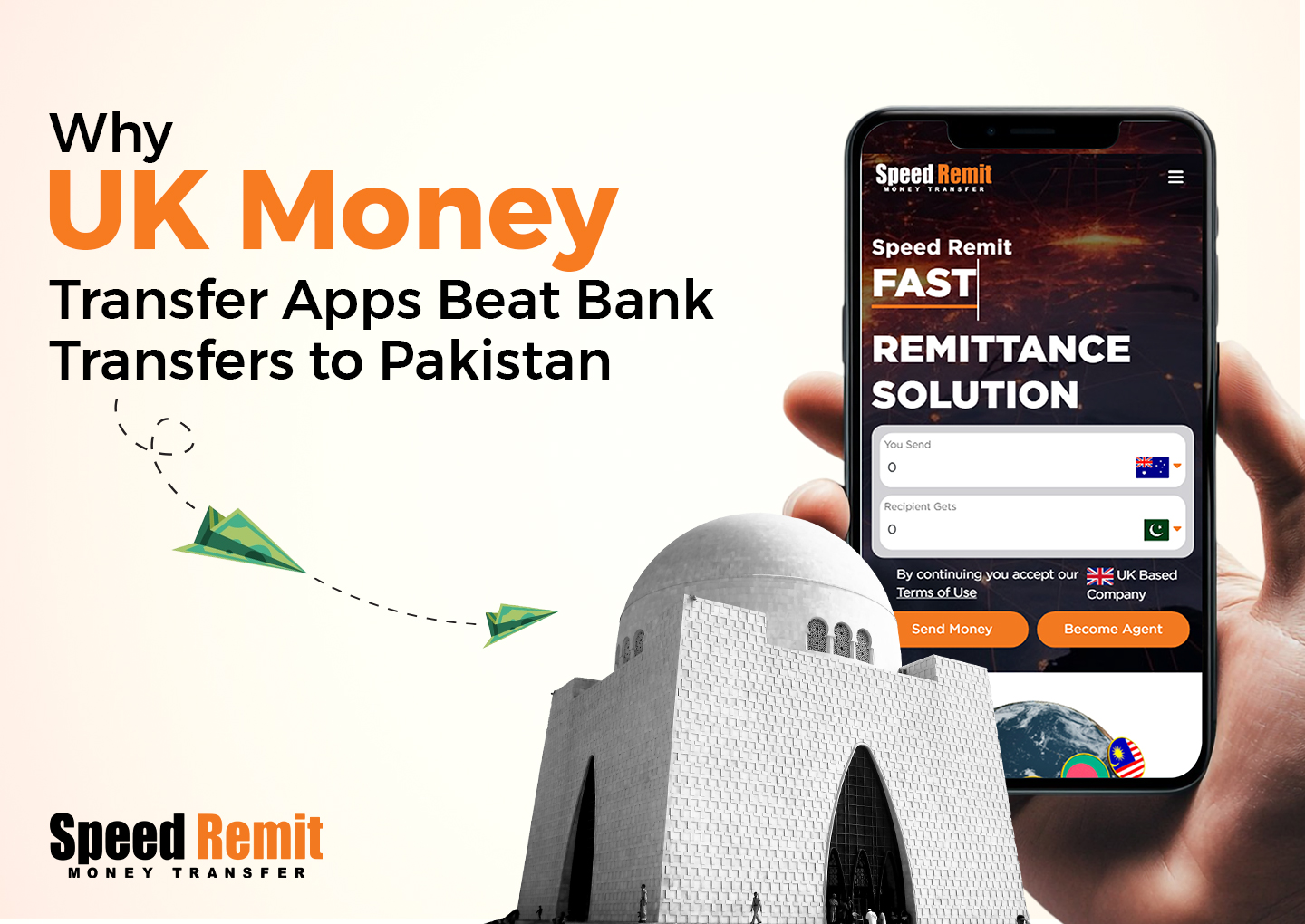For millions living in the United Kingdom, supporting family back home is more than a responsibility—it’s a part of life. Routine payments to Pakistan from the UK include food, healthcare, education and family support. Banks used to process many global money transfers, but now money transfer apps are utilised more often by expats.
Sending money from UK to Pakistan is mainly done through mobile apps. Why? They often give you smooth transactions, low fees and exceptional comfort, which other banks do not provide.
This blog looks at what makes money transfer apps the preferred choice for people to send money to Pakistan from UK.
Table of Contents
1. Speed and Real-Time Transfers

When urgency matters, speed is everything. Your money might not arrive in Pakistan from a traditional transfer for several business days. During holidays, weekends and when banks take time for internal processing, waiting gets longer.
On the other hand, such apps focus on sending money almost instantly. Many apps provide funds quickly: Minutes for instant money transfers to another wallet, bank account or cash. The difference is essential for people in the UK who have to move money quickly to Pakistan for any reason.
2. Lower Costs and Transparent Fees

International bank transfers often come with layered fees. Such bills might include expenses for transactions, extra costs for conversions, and deductions by the intermediary banks. Not only do these fees lower the pay, but they can also be hard to predict.
Most money transfer apps instead show their prices openly and clearly. People transferring money see the amount they will receive in PKR before confirming. Because everything is clear, you can pick the exemplary service and save money on every transaction.
Transferring money often from the UK to Pakistan means the minor changes in fees and rates can make a difference to your total costs, which is why using apps usually works out cheaper in the long run.
3. Better Exchange Rates
Banks usually add a secret fee to exchange rates, making you lose some of your money without noticing. Seemingly, the difference between using a bank and a money transfer service is not much, but it adds up fast if you move larger or more frequent amounts.
Most of these apps provide rates much closer to the mid-market exchange price, which is better than that of banks. So, someone in Pakistan gets more Pakistani Rupees even though you send the funds in GBP.
4. Ease of Use and Accessibility
Bank transfers—especially international ones—can be confusing. It can be very frustrating to deal with SWIFT codes, IBANs and extensive paperwork, mainly for people going through the process for the first time. Many people do not want to go to a bank branch, and waiting in line to handle a transfer can be tedious.
The strengths of money transfer apps come from their user-friendly interface, the ability to use them on mobile, and the ease of use. You can set up your account, make payments and view transaction history all on your phone.
Whether you’re tech-savvy or not, apps make it incredibly easy to send money from UK to Pakistan, anytime, anywhere.
5. More Delivery Options for Recipients
Not all citizens in Pakistan own bank accounts, mainly in remote or undeveloped places. Making a traditional bank transfer demands an active account, and going to the bank in person is usually necessary.
They provide more options by making it possible to send money directly to mobile wallets, pick it up as cash at many locations, or arrange for it to be delivered at home. More people can use the service, regardless of whether they have bank accounts or where they are located.
6. 24/7 Availability
Not individual in Pakistan has a bank account, mainly in remote or less developed parts of Pakistan. A usual requirement for a traditional bank transfer is an active account, and you might need to show up in person.
People have more choices because they can send cash instantly to a mobile phone, visit a store to get it in person or agree to have someone deliver the money to their address. There are fewer restrictions on who can sign up—it is accessible to those with and without bank accounts from different places.
7. Transparency and Tracking

Sometimes people complain that they have little or no visibility with bank transfers. Once you send the money, you often don’t know where it is or when it will arrive. Updating your account means being on hold or going to a physical location.
Money transfer apps address this with real-time updates, SMS, and email notifications. You and your recipient can follow the transaction’s progress at every step, adding reassurance and trust to the process.
8. Security and Regulation
There’s a misconception that only banks are secure when it comes to transferring funds, particularly when you send money from the UK to Pakistan, but the latest happenings in the remittance world also manifest the highly encrypted mechanism of online money transfer providers.
These days, apps rely on encryption, safe login techniques, and two-factor authentication to secure user data and transactions. Many are regulated by the UK’s Financial Conduct Authority (FCA), ensuring their operations meet high safety and transparency standards.
9. Support and Feedback Loops

Money transfer apps do very well when it comes to customer service. Chatting with a customer service representative, using multilingual resources, and sending emails usually work well for many apps. You can read real users’ reviews and ratings, making it easier to decide who to choose as your provider.
Alternatively, banks usually do not have as many flexible ways to help, and often clients must come in or wait a long time for support over the phone.
10. Better Fit for Modern Lifestyles
Most people now handle their banking, shopping, and medical needs using their mobile devices. Naturally, how we move money from one place to another has to develop over time. Apps align with this shift, offering mobile-first solutions that adapt to today’s fast-moving lifestyle.
Sending money from UK to Pakistan is possible while commuting, having lunch, or on your trips, and it doesn’t require any papers or going to a bank branch.
Conclusion
Many Pakistani expatriates in the UK happily send money to Pakistan. While banks still serve a role, they fall short in areas that matter most to today’s users—speed, cost, accessibility, and convenience. While utilising a money transfer app from UK to Pakistan, you have better control, visibility & ways that assist you.
As with any financial service, it’s essential to choose a reliable and regulated provider, double-check recipient details, and stay updated on fees and exchange rates. But overall, remitting money online is easier and more convenient, and many people now choose money apps for cross-border transfers.



